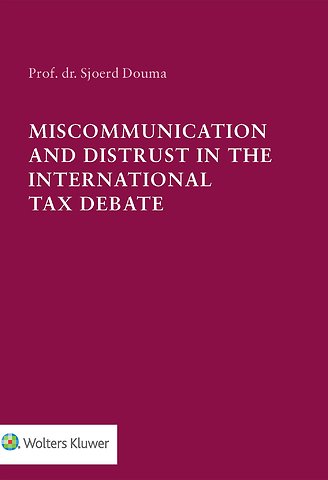Miscommunication and Distrust in the International Tax Debate
E-book Epub met watermerkbeveiliging Engels 2018 1e druk 9789013150339Samenvatting
The global economic and financial crisis has eroded the underpinnings of the international tax system. Should tax authorities, ministries of Finance, multinational companies and tax advisors communicate differently to sway public opinion for the better? Should politicians institutionalize trust? This inaugural lecture explores these and similar questions.
After the global economic and financial crisis erupted in 2008, governments were forced into austerity measures. Job losses, increased tax bills and enormous State support for financial institutions whirled an ever-increasing spiral of pessimism, spanning across the globe.
Aside from the many changes to the domestic and international tax rules, the world is left with damaged public opinion towards the actors that make up the international tax system. The system - consisting of actors such as tax authorities, ministries of Finance, multinational companies and tax advisors - is met with public distrust and frustration.
Miscommunication and Distrust in the International Tax Debate explores these pressing issues within the scope of the international tax debate. In addition to providing an analysis of the present situation, this inaugural lecture seeks to illuminate a fruitful way forward.
The reader gains a deeper understanding of the key questions within the international tax debate. Should the actors and stakeholders within communicate differently? Should there be more transparency by everyone involved in the debate? And are politicians wise to institutionalize trust through legislative change?
The author’s purpose is threefold. Firstly, he aims to systemize and analyze the interaction in the international tax debate. Secondly, this contribution applies insights from communication science in order to understand and explain this development. Thirdly, he presents a way forward for the international tax debate, leading to more trust and effective communication.
Specificaties
Lezersrecensies
Inhoudsopgave
U kunt van deze inhoudsopgave een PDF downloaden
2. The international tax debate: state of play / 11
2.1 Introduction / 11
2.2 Dutch perspective / 11
2.2.1 Introduction / 11
2.2.2 The tax advisory community / 12
2.2.3 The business community / 13
2.2.4 Non-governmental organizations (NGOs) / 14
2.2.5 The Ministry of Finance / 15
2.2.6 The Dutch tax authorities / 16
2.2.7 The European Commission / 16
2.2.8 Academia / 17
2.2.9 Politicians / 18
2.2.10 Take away / 18
2.2.11 Public opinion / 20
2.3 British perspective / 20
2.3.1 Introduction / 20
2.3.2 What stakeholders expect / 20
2.3.3 The issue of declining trust in businesses / 26
2.3.4 Take away / 27
2.4 Global perspective / 27
2.4.1 Introduction / 27
2.4.2 G20 public trust in tax / 28
2.4.3 Take away / 31
2.5 Concluding remarks / 31
3. Understanding the debate through communication science / 33
3.1 Introduction / 33
3.2 Mass communication theory / 33
3.3 Public opinion / 34
3.4 The role of the media / 35
3.4.1 Information processing / 35
3.4.2 Agenda setting, framing and priming / 36
3.4.3 Reporting by the media in times of economic crisis / 39
3.4.4 The role of the media in the international tax debate / 40
3.5 Conclusions / 41
4. The way forward / 43
4.1 Introduction / 43
4.2 Towards a public opinion of better quality / 43
4.3 Media ethics / 46
4.4 Concluding remarks / 47
5. Conclusions and outlook / 49
6. Word of thanks / 51
Literature / 53
Curriculum Vitae / 59
Anderen die dit e-book kochten, kochten ook
Rubrieken
- advisering
- algemeen management
- coaching en trainen
- communicatie en media
- economie
- financieel management
- inkoop en logistiek
- internet en social media
- it-management / ict
- juridisch
- leiderschap
- marketing
- mens en maatschappij
- non-profit
- ondernemen
- organisatiekunde
- personal finance
- personeelsmanagement
- persoonlijke effectiviteit
- projectmanagement
- psychologie
- reclame en verkoop
- strategisch management
- verandermanagement
- werk en loopbaan








